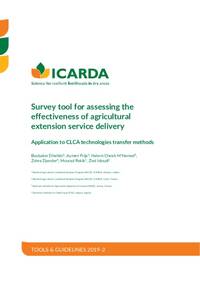Survey tool for assessing the effectiveness of agricultural extension service delivery: Application to CLCA technologies transfer methods

Authors:
The project “Use of conservation agriculture in crop–livestock systems (CLCA) in the drylands for enhanced water use efficiency, soil fertility and productivity in North East, North Africa (NENA) and Latin America and the Caribbean (LAC) countries” aims to develop contextually relevant processes for enhancing the broad uptake of conservation agriculture (CA) within integrated crop–livestock systems in drylands and in NENA regions (Algeria and Tunisia).
Experience across North African countries has shown that the adoption and dissemination of CA technologies is low. Farmers are considered very conservative in regard to change and are unaware of CA technologies when it comes to the integration between cropping and livestock. Wide-scale adoption of these technologies remains a challenge, especially among smallholder farmers in arid areas.
There is evidence that extension activities can help to accelerate the adoption of new technologies, particularly if the new technologies can be proved to be more successful than existing ones, if their effects can be observed, and if they are socially compatible, simple to learn, and can be trialed or tested—as is the case with CLCA technologies. However, the level of adoption should not always be used as a measure of the success or failure of an extension program because it is the effectiveness of the extension delivery mechanism that is, to a large extent, responsible for the success or failure of an extension program. An alternative means of evaluating CLCA extension programs is through the assessment of the technology transfer methods applied by the project. This mainly consists of the measurement and empirical evaluation of the learning situations provided—the extension delivery mechanism or process—as a means of measuring the effectiveness of extension methods as part of a transfer model for these improved and sustainable technologies.
Within this framework, the CLCA project team is conducting interviews with CLCA adopters and those who plan to adopt these technologies in future (‘planners’) to (i) determine farmers’ (both adopters and planners) perception of the effectiveness of extension methods for the CLCA technologies, and (ii) determine their perceptions of the impact of extension activities on their livelihood. The findings will help decision makers and extension program planners to accelerate the adoption process and consequently conduct a rigorous assessment of its impact relative to the effectiveness and efficiency of the extension delivery process for CLCA technologies.
